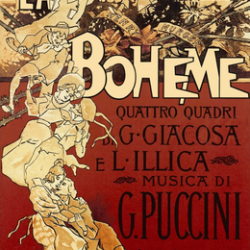
La bohème in Scotland
Posted 15 Apr 2017
La Bohème was first performed in Scotland (under the title The Bohemians) on 30 April 1897 at the Theatre Royal, Glasgow.
Just eight days previously in Manchester, Carl Rosa Opera had given the first British performance watched by Puccini himself, as well as his publisher, Tito Ricordi. Their Glasgow soloists were identical. The conductor was Claude Jaquinot, and the cast was headed by a leading American soprano as Mimì. Alice Esty, having already sung at the Met, had now made her home in Britain. The other principals included Robert Cunningham (Rodolfo), William Paull (Marcello), Arthur Winckworth (Colline), Charles Tilbury (Schaunard) and Bessie Macdonald (Musetta).
The critic from the Glasgow Herald, ending his lengthy and enthusiastic review on 1 May, said: ‘The Carl Rosa Opera Company have produced operas, which, after a brief season, passed out of the bill. The Bohemians, we venture to think, has come to stay.’
Despite this perceptive comment, it took a while for the piece to catch on. The next performances, by the Moody-Manners Company, were not until 1907, when the Italian conductor, Romualdo Sapio, led a cast that included his American wife, another Met veteran, Clementine de Vere Sapio, as Mimì. The Rodolfo was a very important British tenor, John Coates. When Fanny Moody and her husband Charles Manners retired, one of their leading tenors, Joseph O’Mara, started his own company, taking on many of the same singers. They gave their first performance of La bohème in 1917, at Her Majesty’s Theatre, Dundee, with O’Mara himself as Rodolfo.
It was between the wars that the opera’s popularity became established. The Carl Rosa and O’Mara companies continued to present it. There was also Sir Thomas Beecham’s company, succeeded in 1922 by the British National Opera Company, which in turn was relaunched as the Covent Garden Opera in 1929. The BNOC, in particular, toured beyond the central belt, performing in both Dundee and Aberdeen. The conductor for many of the Bohème performances at this time was the young John Barbirolli, already recognized as an idiomatic Puccini conductor. Among the Scottish singers to appear at this time were the soprano Noël Eadie (Mimì), tenor Joseph Hislop (Rodolfo) and bass William Anderson (Colline).
While the post-war years were dominated first by the Carl Rosa and then by Sadler’s Wells, the 1950s also saw several visits by a touring company from Italy. It boasted several star soloists, including tenor Gianni Raimondi (Rodolfo) and sopranos Virginia Zeani and Margherita Carosio (both as Mimì). The tenor Charles Craig was a leading singer with Carl Rosa, while several Australian sopranos, including Joan Hammond and Elizabeth Fretwell, appeared with Sadler’s Wells. The Wells brought Bohème north on six of their tours with a staging originally under the direction of Tyrone Guthrie. Their 1958 visit, covering all four of the Scottish cities, was conducted by young Alexander Gibson. Among the regular company members were several notable Scots at the start of their careers. These included tenors William McAlpine and William Aitken (Rodolfo), as well as basses Harold Blackburn and David Ward (Colline).
Scottish Opera tackled the work for the first time in 1967. Gibson conducted, under the direction of Peter Ebert, with the cast setting off excellent traditional designs by Peter Rice. For the second act café scene the chorus was meticulously rehearsed to walk around the stage while singing, so that the vocal sections became mixed up and the sound blended very freshly. Rodolfo was sung by the young American tenor George Shirley, recently introduced with enormous success at the Met, and the popular Lebanese soprano Luisa Bosabalian. The staging was revived several times in the seventies, with excellent Scottish singers appearing. These included Linda Esther Gray (Mimì), Patricia Hay (Musetta), Marie Slorach (both roles), Ronald Morrison (Marcello), William McCue (Colline) and Gordon Sandison (Schaunard). Sir Charles Groves conducted some performances of notable subtlety.
The company’s second production in 1988 was a meticulously detailed staging by Elijah Moshinsky, designed by Michael Yeargan. John Mauceri conducted a cast that included Jane Eaglen (Mimì), Jorge Pita (Rodolfo), Susan Burghardt (Musetta) and Steven Page (Marcello). At various later revivals, singers who appeared included Simon Keenlyside (as both Marcello and Schaunard), Francesca Pedaci (Mimì), Richard Paul Fink and Gordon Sandison (Marcello), Patrick Power, Peter Bronder and Ian Storey (Rodolfo) and Roderick Williams (Schaunard).
Scottish Opera’s third staging in 2004 offered a more radical view, Stewart Laing’s concept taking in a New York loft apartment with garish lighting and modern dress. The conductor was Richard Farnes, with a natural sense of style, and the cast included Rachel Hynes (Mimì), Peter Auty (Rodolfo), Roderick Williams (Marcello), Alessandro Guerzoni (Colline) and Roland Wood (Schaunard). The 2010 revival, conducted by Francesco Corti, introduced Celine Byrne and Avi Klemberg as Mimì and Rodolfo.
Scottish Opera also mounted medium-scale touring productions in 1973 and 1977 (both as part of Opera for All), 1987, 1995 and 2001 (revived in 2002 and 2006).
Particularly in recent years, the opera has been seen with great frequency. Full-scale performances have been imported from Eastern Europe by Ellen Kent, and toured widely. There have also been small-scale ventures by several groups of young professionals.
So far, the only Bohème-free zone has been the Edinburgh International Festival, which ignored the opera throughout its first sixty-nine years of existence. That is now due to change, with the planned visit for the seventieth Festival of the opera company from Turin that first launched the work in 1896.
Archive
2025
December
2024
November
March
2023
November
March
January
2022
August
July
2019
October
2018
September
February
2017
November
2016
November
October
September
May
March
February
2015
December
October
September
March
2014
October
March
2013
November
February
2011
December
November
September
August
June